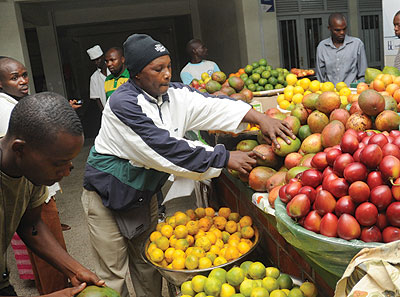Increasing access to financial services is one of the Government’s priorities as Rwanda looks to ensure a self-reliant populace, John Rwangombwa, the central bank governor, has said.


Increasing access to financial services is one of the Government’s priorities as Rwanda looks to ensure a self-reliant populace, John Rwangombwa, the central bank governor, has said."Rwanda’s vision is to ensure financial inclusion, especially for the rural masses. In fact, we have made significant progress towards this target. So far, we have been able to double formal financial inclusion from 21 per cent of adults in 2008 to 42 per cent as at the end of last year,” Rwangombwa noted.Rwangombwa was reacting to the call on governments to enhance financial inclusion to end global poverty at the recent World Leaders Forum in Washington, USA.According to the leaders at the forum, most small businesses in emerging markets have no access to finance, which hinders their growth and ability to generate the much-needed new jobs.They also noted that the majority of the 2.5 billion adults globally are ‘unbanked’, while close to 200 million micro-to-medium enterprises in developing economies lack access to affordable financial services and credit, and often use informal methods to save, borrow and secure their assets. "This undermines efforts to reduce poverty levels worldwide,” the global leaders noted.Speaking at the forum, Jim Yong Kim, the World Bank president, noted that instruments such as e-money accounts, debit cards and low-cost regular bank accounts can significantly increase financial access by 2020 "for those who are now excluded” if adopted.More than 50 countries globally have already committed themselves to increase access to financial services among the citizenry."If the private sector in these countries responds by unleashing their resources and know-how, then we can reach universal access by 2020,” Kim said. He said access to savings accounts, credit or remittances can help families afford essential services like water, electricity, housing, education and health care."When firms gain access to financial services such as credit or insurance, they can reduce business risks, expand their firms and create more jobs. Low cost, accessible transactions instruments and bank accounts can provide a gateway to this range of financial services,” Kim pointed out. To improve access to financial services and credit, banks in Rwanda are looking to ICTs and other means to ensure that the unbanked masses in the rural areas are brought on board. "Agency and electronic banking are some of the initiatives meant to take banking services nearer to the unbanked people at a cheaper cost,” said Maurice Toroitich, the KCB Rwanda managing director.Toroitich urged banks to tap into mobile and agency banking platforms to achieve Rwanda’s financial inclusion targets.


